Select Language

By Stella Qiu
SYDNEY (Reuters) -Australian inflation was surprisingly strong in the third quarter amid broad-based and stubborn cost pressures, a headache for policymakers that added greatly to the risk of a rise in interest rates as early as next month.
Investors reacted by narrowing the odds on the Reserve Bank of Australia (RBA) restarting the tightening cycle next month after four months of pauses, with futures now pricing in a 66% chance of a quarter-point hike to 4.35%, compared with 35% before the data.
Data from the Australian Bureau of Statistics on Wednesday showed the consumer price index (CPI) rose 1.2% in the third quarter, above market forecasts of 1.1% and up from a 0.8% increase the previous quarter.
The annual pace of inflation slowed to 5.4%, from 6.0%, but was again above forecasts of 5.3%. For September alone, the CPI rose 5.6% compared to the same month a year earlier, up from 5.2% in August.
A closely watched measure of core inflation, the trimmed mean, rose 1.2% in the third quarter, to top forecasts of 1.1%. The annual pace slowed to 5.2%, from 5.9%.
The Australian dollar rose 0.6% to a week high of $0.6398 and three-year bond futures tumbled 15 ticks to 95.68, the lowest since 2011. Markets are now seeing rates peaking at 4.45% early next year, up from 4.35% before the data release.
Adam Boyton, head of Australian research at ANZ, now sees a quarter-point hike from the RBA next month, given the uncomfortably high inflation and the recent hawkish guidance from policymakers.
"While 4.35% should mark the peak in the cash rate, there is a risk it could tighten beyond that. Any easing remains a very long way off," Boyton said.
The biggest contributors to the third quarter inflation were fuel, rents, and electricity. Fuel prices rose 7.2% from a year ago, reversing two quarters of price falls, with the conflict in the Middle East potentially set to further stoke inflationary pressures.
Inflation remained elevated for a range of services such as vets, restaurant meals and hairdressers. Rents rose 7.6% from a year ago, the fastest since 2009.
One silver lining in the report is that food prices registered the slowest quarterly rise in two years as prices fell for fruit and vegetables.
Supermarket giant Woolworths said on Wednesday that average prices for the products it sold in the September quarter rose just 2% over a year earlier, a significant moderation compared with previous quarters.
Still, Michele Bullock, the new RBA governor, on Tuesday warned that there were risks inflation would prove more stubborn than expected and interest rates might have to rise further to bring it to heel.
Policymakers have said they have a low tolerance for allowing inflation to return to target at a slower pace than currently expected. The central bank forecast in August that inflation was only projected to return to the top of the bank's target band of 2-3% in late 2025.
The central bank will release its updated economic forecasts in early November.
"This brisk pace of core inflation signals that cost pressures are broad and heightened in the economy, in part stemming from the very tight labour market," said Sean Langcake, head of macroeconomic forecasting for Oxford Economics Australia.
"Governor Bullock's communications this week have laid the ground work for tighter policy, and the tick up in core inflation could well justify another round of rate hikes."
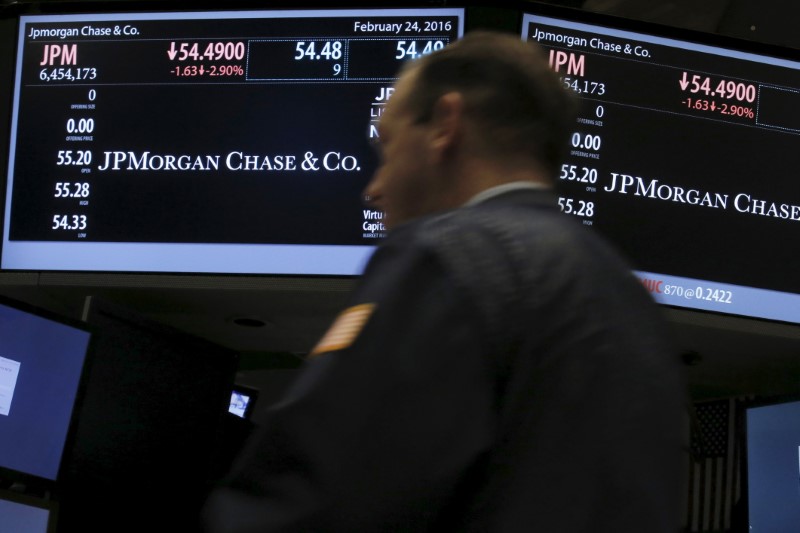
Jamie Dimon, CEO of JPMorgan, has expressed skepticism about the effectiveness of central banks' economic forecasts in navigating potential economic turbulence. Speaking at the Future Investment Initiative Summit, Dimon urged preparedness for diverse economic outcomes and criticized the excessive reliance on governments and central banks to steer through economic challenges.
Dimon also downplayed the potential effect of an additional 25 basis point hike by the Federal Reserve. This comes after a series of 11 rate hikes since 2022, with no further adjustments expected in November. Despite these increases, Dimon's comments suggest that further hikes may have a limited impact on the economy.
In his address, Dimon also voiced concerns over record peacetime fiscal spending and global overspending. He highlighted these aspects as potential destabilizers to economic stability. Furthermore, he pointed out the ongoing conflict in Ukraine as another factor that could potentially disrupt economic stability globally.
The CEO's remarks underscore a growing sentiment among financial leaders regarding the limits of monetary policy in addressing complex global economic issues. His call for readiness rather than definitive predictions indicates a shift towards a more cautious approach to economic planning and forecasting amidst an increasingly uncertain global economic landscape.
This article was generated with the support of AI and reviewed by an editor. For more information see our T&C.

By Kanishka Singh
WASHINGTON (Reuters) -Officials from the United States and China on Monday held a two-hour long virtual meeting to discuss domestic and global macroeconomic developments, the U.S. Treasury Department said, calling the meeting "productive and substantive".
THE TAKE
Ties between the world's two largest economies have been strained in recent years due to a number of issues including Taiwan, the origins of the COVID-19 pandemic, allegations of spying, human rights issues and trade tariffs.
Senior officials from both sides have been meeting each other in recent months to lay the ground for an expected meeting between U.S. President Joe Biden and Chinese leader Xi Jinping in San Francisco in November.
KEY QUOTES
"Today, the United States and the People's Republic of China held the first meeting of the Economic Working Group (EWG), which serves as an ongoing channel to discuss and facilitate progress on bilateral economic policy matters," the Treasury Department said.
China's finance ministry said the two sides had "in-depth, frank and constructive" talks, and also discussed bilateral cooperation in "addressing global challenges".
Both sides will continue to maintain communication, the ministry said.
U.S. and Chinese officials also raised "areas of concern," statements from the two sides said, without elaborating. The meeting was led by senior officials from the U.S. Treasury Department and China's finance ministry.
The EWG was launched last month following U.S. Treasury Secretary Janet Yellen's trip to Beijing in July. It was launched in parallel with a financial working group, which will hold its first meeting on Wednesday.
CONTEXT
The economic meeting follows other high-level engagements between the two countries in recent months that have seen visits from U.S. officials to China like Secretary of State Antony Blinken in June, Yellen in July and Commerce Secretary Gina Raimondo in August.
More recently, Blinken met Chinese Vice President Han Zheng in New York and U.S. National Security Adviser Jake Sullivan met Chinese Foreign Minister Wang Yi in Malta. China's top diplomat will travel to the United States later this week to meet Blinken.
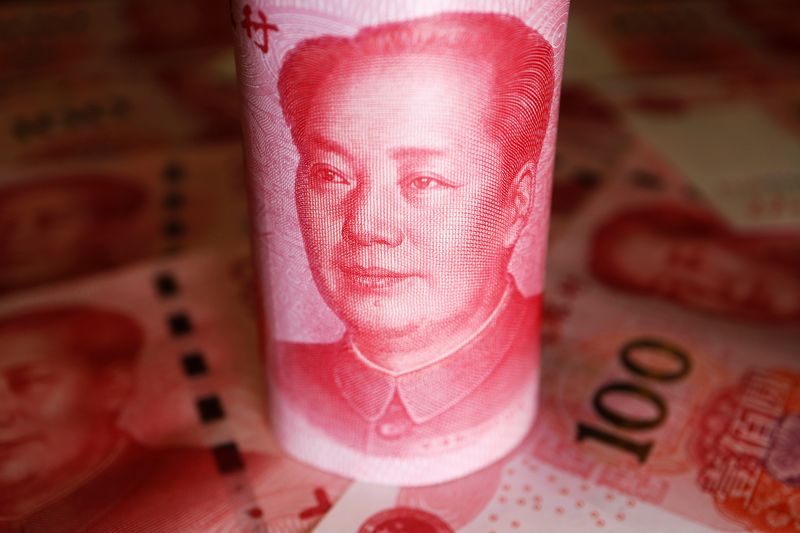
(Reuters) -China is set to approve slightly more than 1 trillion yuan ($137 billion) in additional sovereign debt issuance on Tuesday as Beijing steps up its efforts to spur infrastructure spending and encourage economic growth, three sources told Reuters.
China's top legislators, the standing committee of the National People's Congress (NPC), are set to approve the extra debt issuance on the last day of a meeting which has run from Oct. 20 to Oct. 24, said the sources, who declined to be named due to confidentiality constraints.
Beijing is aiming to announce the plans as soon as late-Tuesday and begin issuing the debt, which is among the measures the Chinese government is taking to shore up the economy during down cycles, in November, two of the sources added.
In a sign that recent policy measures may be helping to bolster a tentative recovery, China's economy grew at a faster-than-expected rate in the third quarter, while consumption and industrial activity in September also surprised on the upside.
The third-quarter expansion put the government's annual growth target of around 5% for the world's second-largest economy within reach, analysts said.
Two of the sources, said that nearly half of the proceeds to be raised from the additional bond issuance would be spent on water conservancy and flood prevention projects, while the rest would be mainly used for post-disaster reconstruction and high-standard farmland construction.
China, which has experienced an unusually wet summer this year with devastating flooding in its northern and northeastern provinces, has so far mainly relied on local government special bonds rather than sovereign debt to fund infrastructure needs.
This prompted China's top leadership and central government to pledge in August to strengthen water conservancy and other infrastructure in the north of the country and to improve its ability to prevent and respond to floods and droughts.
The province of Hebei may spend two years on post-flood reconstruction, state media reported, after Typhoon Doksuri battered northern China in August, causing at least 29 deaths and 95.8 billion yuan of direct economic losses there alone.
China's State Council Information Office, which handles media queries on behalf of the government, did not immediately respond to a request for comment. The NPC and the Ministry of Finance also did not respond.
The Chinese parliament is already due to approve this week a bill that will allow local governments to front load part of their 2024 bond quotas, according to state media.
Chinese authorities have so far avoided aggressive fiscal stimulus to bolster the economy, although a property crisis and other headwinds continue to pose risks.
Beijing has in recent weeks unveiled a raft of measures, including more public works spending, interest rate cuts, property easing and efforts to shore up the private sector, after China's growth momentum dropped.
But its ability to spur growth has been hamstrung by fears over debt risks and a fragile yuan.
($1 = 7.3171 Chinese yuan renminbi)
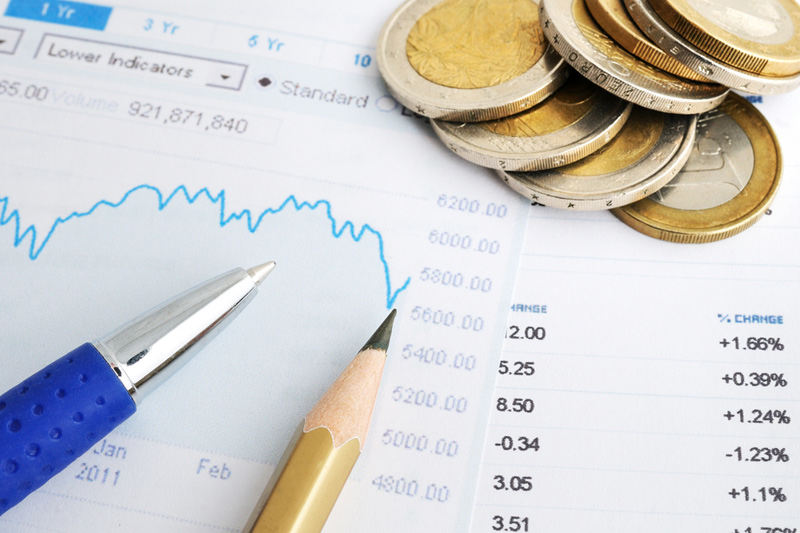
(Reuters) - Suriname offered to exchange $675 million of dollar bonds for new notes, its government said on Monday, as the South American nation looks to continue debt talks with China next month.
It invited investors in debt due in 2023 and 2026 to swap their holdings for a new 10-year bond due July 15, 2033, with an annual interest rate of 7.95%.
Suriname will also issue notes with payouts linked to the government securing at least $100 million in oil royalties from an offshore reserve known as Block 58.
Once the $100 million is reached, Suriname will allocate 30% of its annual royalty income from Block 58 for to make payments on a quarterly basis until the notes mature in 2050, it said.
In September, the International Monetary Fund (IMF) board cleared the third review of its programme of more than $600 million for Suriname, granting the government's request for a waiver of non-compliance based on measures already taken.
Suriname said this month its foreign minister would visit Beijing in early November for talks, following China's counter response to a proposal regarding two-way debt negotiations.
It reached a deal with private bondholders in May.
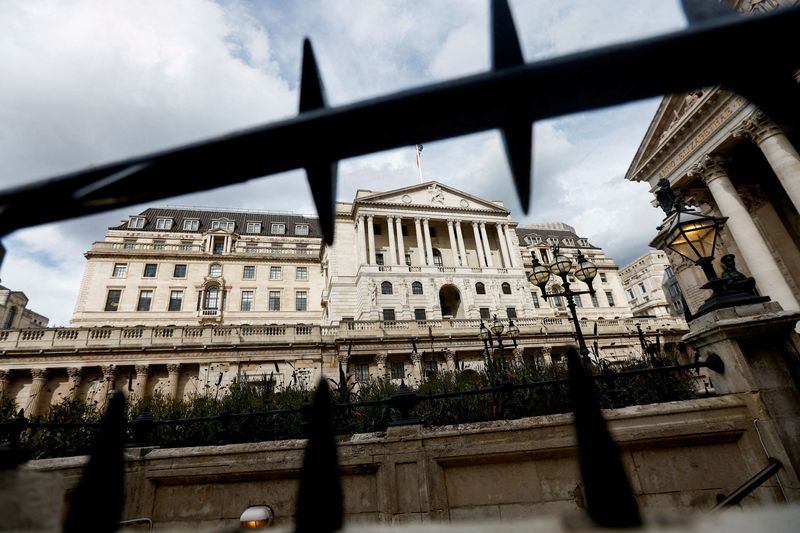
By Jonathan Cable
LONDON (Reuters) - The Bank of England is likely done with policy tightening and will leave Bank Rate at 5.25% on Nov. 2, according to the vast majority of economists polled by Reuters who did however caution the chance of another increase this year was high.
Although inflation unexpectedly held steady at 6.7% in September, the highest of any major advanced economy, 61 of 73 economists in the Oct. 18-23 poll said there would be no move from the Bank next week, in line with market expectations.
"The Bank kept rates on hold in September and there hasn't really been much data since then to change that position. And the data we have had - wages, inflation - wasn't that different to what everybody expected," said James Smith at ING.
"The bigger picture is the impact of previous hikes is still coming through."
Only 12 economists forecast a quarter point rise to 5.50% at the November Monetary Policy Committee meeting.
However, 16 of 28 who answered an additional question said the chance of another lift this year was high. Despite 515 basis points of hikes since December 2021, inflation is still more than three times the BoE's 2% target.
"At some point, when it is more comfortable that core and services inflation are on an established downtrend, the MPC may want to switch to a more neutral guidance. But we don't think it will be ready to make that change just yet," noted Elizabeth Martins at HSBC.
September's inflation data was not far off what the Bank had expected, BoE Governor Andrew Bailey said last week, adding a slowdown in core inflation, which strips out volatile food and energy prices, was "quite encouraging".
Inflation was expected to gradually decline across the forecast horizon but it won't reach target until Q2 2025, the poll showed. It will average 3.0% next year and 2.2% in 2025.
The first cut to Bank Rate won't come until at least July, the majority of economists said, with a median prediction for a 25 basis point reduction in the third quarter. Around one-third of economists expected the Bank to act earlier.
That median expectation would put it slightly behind the United States Federal Reserve, which a separate Reuters poll narrowly suggested would begin easing in Q2, but in step with the European Central Bank's likely time scale.
The BoE was forecast to reduce Bank Rate by 50 basis points in the fourth quarter, putting it at 4.50% by year-end.
SLOWLY, SLOWLY
Britain will dodge a recession, median forecasts showed, but the outlook was weak. Having likely contracted 0.1% last quarter it will flatline in this one and eke out only 0.1% growth in the first two quarters of next year.
"It's a story of very slow growth over the next few quarters rather than an outright meaningful recession," ING's Smith said.
Still, a closely watched purchasing managers survey due later on Tuesday is expected to show business activity shrank again this month.
In the latest Reuters poll, 12 of 31 economists had a recession - two consecutive quarters of contraction - as their base case compared with eight of 23 in a September poll.
Across 2024 growth was put at 0.4% but the economy will rebound the following year and expand 1.4%, slightly weaker than the 0.5% and 1.5% medians, respectively, published in last month's poll.
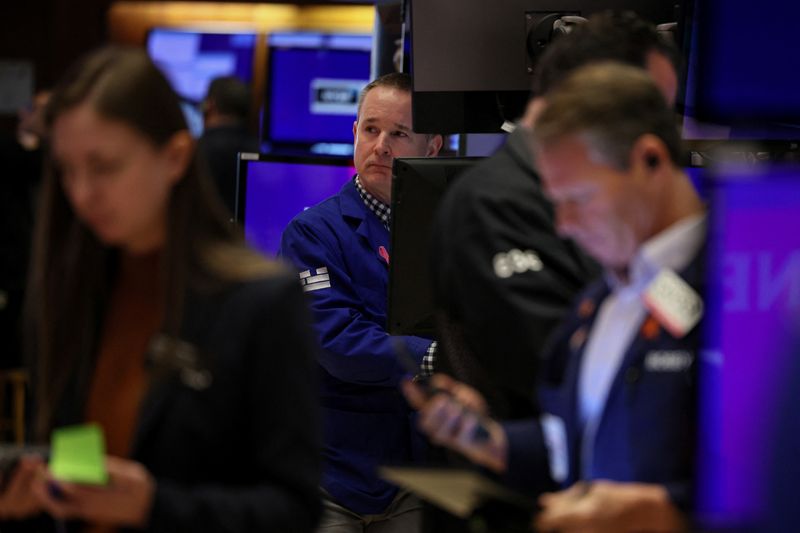
By Isla Binnie
NEW YORK (Reuters) - Money managers in the United States have closed funds with sustainability mandates faster than they opened new ones over the past three months as investor appetite waned for the asset class overall, data firm Morningstar said on Monday.
Investment products with a declared aim to promote ethically responsible practices, from cutting greenhouse gas emissions to increasing workplace diversity, have lost their lustre in the U.S. since a 2021 boom, as regulators scrutinised how they were marketed and Republican politicians alleged industries were being boycotted to the detriment of retirees' savings.
"For the first time in recent history, sustainable fund departures outpaced arrivals" in the three months September, Chicago-based researcher Alyssa Stankiewicz wrote.
Three new funds were launched while thirteen closed in this category. One existing fund took on the "sustainable" label and four other funds moved away from that mandate.
Morningstar's definition includes open-ended and exchange-traded vehicles with a "clear and prominent commitment" to sustainability, impact or environmental, social and governance (ESG) factors.
The slowdown came on the heels of 27 launches and 9 closures in the previous quarter, and compares with a record 44 launches in the fourth quarter of 2021.
Investors pulled money out of U.S. funds in general in the period, but sustainable funds fared worse than conventional peers, registering their fourth consecutive quarter of outflows for a contraction of 0.85% versus 0.02% for the total fund universe. More conventional funds were launched than closed in the third quarter.
"Although the motivations behind outflows cannot be perfectly quantified, many factors are in play," Stankiewicz said. "These include rising energy prices, high interest rates concerns about greenwashing, and political backlash."
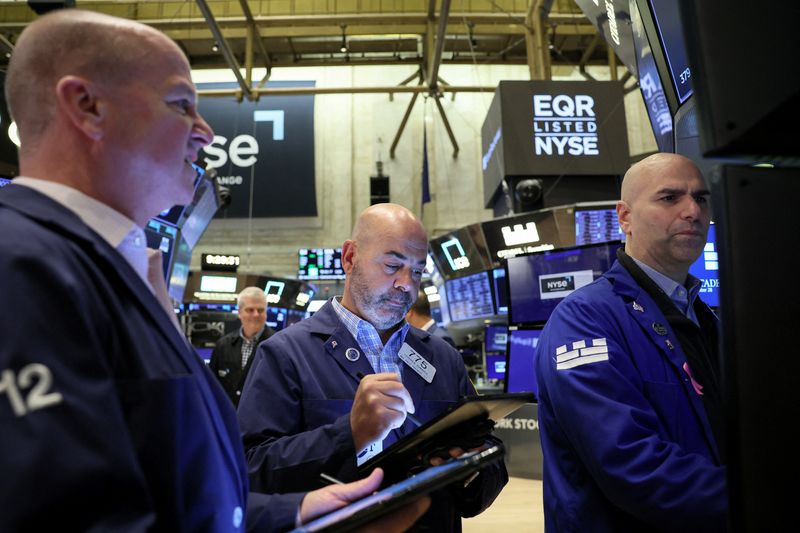
(Reuters) -Escalating tension in the Middle East and surging U.S. bond yields set financial markets up for more turbulence, exacerbated by high oil prices and China's property pain.
The European Central Bank looks set to sit tight after a string of interest rate hikes, while there is a slew of U.S. earnings and Argentina's presidential election.
Here's your week ahead in markets from Amanda Cooper and Naomi Rovnick in London, Kevin Buckland in Tokyo, and Lewis Krauskopf and Rodrigo Campos in New York.
1/ UNEASY CALM
War is raging between Israel and Palestinian militant group Hamas and an uneasy calm grips markets as they wait and see how the conflict unfolds.
Market reaction has been relatively modest with Wall Street's so-called fear gauge, the VIX index, showing investors are not as nervous as they were when Russia invaded Ukraine last year - at least, not yet.
Oil is the barometer to watch. It hit $93 a barrel on Wednesday as the risk of escalation threatened to disrupt Middle East oil supplies.
A wider conflict would deliver another shock to markets, potentially forcing the hand of central banks that have been unswerving in their determination to fight inflation.
The "flash" manufacturing and service sector activity surveys in coming days could add to uncertainty if they point to economic weakness.
2/ STOPPING HERE?
The European Central Bank, meeting on Thursday, will likely have one eye on the potential for conflict in the Middle East to disrupt dis-inflationary trends and the other on a weakening economy.
Hopes for rate cuts would be premature. ECB chief economist Philip Lane says the central bank was still "quite some distance" from easing monetary policy.
But traders can expect, at least, a pause for now.
After the ECB raised its deposit rate at each of its last 10 meetings to a current record high, policymakers have signaled it is time to keep borrowing costs on hold as they assess the impact of monetary tightening so far.
Canada's central bank, meeting on Wednesday, is tipped to leave rates steady as inflation eases.
3/ CUE THE MEGACAPS
Reports from megacap companies highlight a big batch of third-quarter U.S. corporate earnings, a key test for stocks that have propelled equity indexes higher this year.
Microsoft (NASDAQ:MSFT) and Alphabet (NASDAQ:GOOGL) results are due on Tuesday, Meta Platforms (NASDAQ:META) on Wednesday, and Amazon (NASDAQ:AMZN) on Thursday. Those stocks along with Apple (NASDAQ:AAPL), Nvidia (NASDAQ:NVDA) and Tesla (NASDAQ:TSLA) combined have accounted for the bulk of the S&P 500's 11% year-to-date gain, so any results disappointment could have broad fallout.
Others reporting in the coming week include Coca-Cola (NYSE:KO), General Motors (NYSE:GM), Merck and United Parcel Service (NYSE:UPS). Investors are banking on an overall recovery in U.S. profits after a tepid first half.
Markets also get a fresh look at the state of the economy from data including third-quarter GDP and the monthly personal consumption expenditures price index.
4/ WEEDS VS GREEN SHOOTS
Signs of green shoots for China's economy after upbeat retail sales, factory production and GDP data are hard to spot as the weeds in the property sector get thicker.
Making up a quarter of the world's No. 2 economy, property turmoil threatens China's 5% growth target - even after a consensus-smashing 4.9% quarterly expansion.
That hasn't escaped investors, who pushed mainland shares to a nearly one-year trough.
A lot of what's happening is hidden from view: A default deadline for Country Garden's debt passed in silence, and the property developer was forced to deny its founder and his daughter had fled China. The market is scouring the landscape for who's next, and the sudden resignation of Gemdale's chairman, for unspecified health reasons, spurred a fire sale of its bonds.
Pressure on Beijing for further stimulus is strong and steps so far have disappointed.
5/ CROSSROAD FOR ARGENTINA
Argentina's ruling Peronist coalition smashed expectations in the country's general election on Sunday, setting the stage for a polarized run-off vote on Nov. 19 between Economy Minister Sergio Massa and far-right libertarian radical Javier Milei.
Latin America's third largest economy is engulfed by a severe economic crisis - inflation runs at 138% and is on the verge of going hyper, interest rates stand at 133% and the black-market peso has weakened more than 60% this year alone.
For investors, the survival of the country's $43 billion program with the International Monetary Fund is at stake, as well as the possibility of Argentina defaulting on its debt for the tenth time.
The surprise strength of the Peronists sets up a battle between two polar opposite economic models for the country. The result eases concerns about a radical shift in policies in the event of a decisive win for Milei, who has pledged to dollarize the economy and shut the central bank. But it still leaves the country with few answers to its worst economic crisis in two decades.
(Graphics by Vineet Sachdev, Pasir Kongkunakornkul and Sumanta Sen; Compiled by Dhara Ranasinghe and Karin Strohecker; Editing by Simon Cameron-Moore and Sharon Singleton)
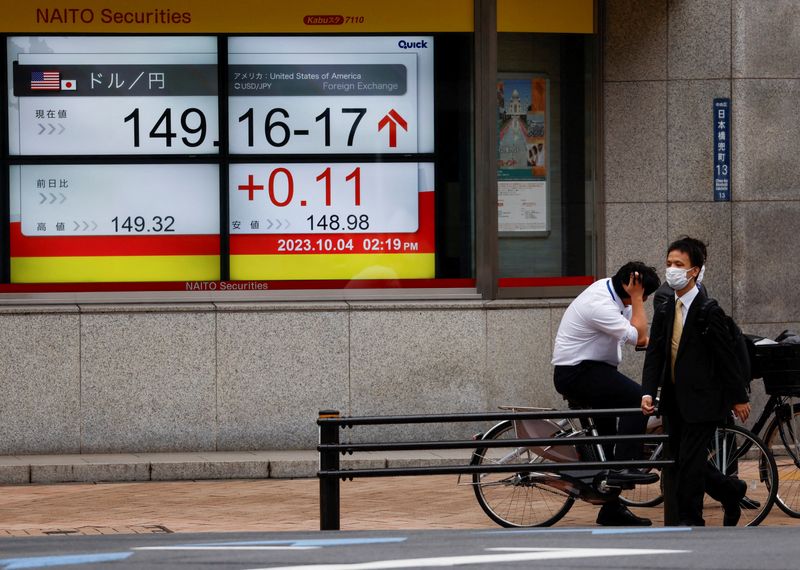
By Wayne Cole
SYDNEY (Reuters) - Asian shares hit one-year lows Monday as the risk of a wider conflict in the Middle East clouded sentiment in a week laden with data on U.S. growth and inflation as well as earnings from some of the world's largest tech companies.
Bonds were also under pressure as U.S. 10-year Treasury yields crept to within a whisker of 5.0%, pushing borrowing costs up across the globe and testing equity valuations.
Washington warned over the weekend of a significant risk to U.S. interests in the Middle East as ally Israel pounded Gaza and clashes on its border with Lebanon intensified.
The European Central Bank and Bank of Canada also hold policy meetings and, while no hikes are expected, investors will be sensitive to guidance on futures moves.
The recent surge in bond yields has tightened monetary conditions without the central banks having to do anything, allowing the Federal Reserve to signal it will likely stay on hold at its policy meeting next week.
Indeed, futures imply around a 70% chance the Fed is done tightening for this cycle and are flirting with the chance of rate cuts from May next year.
The jump in yields has challenged equity valuations and dragged most of the major indices lower last week, while the VIX 'fear index' of U.S. stock market volatility hit its highest since March.
On Monday, MSCI's broadest index of Asia-Pacific shares outside Japan slipped 0.5% to its lowest in almost a year. China's blue chip index lost 0.6% to its weakest since early 2019.
Japan's Nikkei eased 0.6%, as did South Korea's market.
EUROSTOXX 50 futures and FTSE futures were flat. Both S&P 500 futures and Nasdaq futures added 0.2%, underpinned by hopes a rush of earnings reports this week will provide some support.
Mega caps Microsoft (NASDAQ:MSFT), Alphabet (NASDAQ:GOOGL), Amazon (NASDAQ:AMZN) and Meta Platforms (NASDAQ:META) are all reporting. IBM (NYSE:IBM) and Intel (NASDAQ:INTC) are also on the docket.
GROWTH SURGE
Profits should be supported by the strength of consumer demand with figures on U.S. gross domestic product this week expected to show annualised growth of a heady 4.2% in the third quarter, and nominal annualised growth possibly as high as 7%.
"At the same time, last quarter's modest rise in hours worked points to a strong productivity gain and surge in corporate profits," wrote JPMorgan chief economist Bruce Kasman in a note.
"As corporate and household income share the benefits of this nominal activity surge, the underlying resilience of the U.S. private sector is being reinforced."
This U.S. outperformance has underpinned the dollar, though the threat of Japanese intervention has capped it around 150.00 yen at least for the moment. The dollar was last trading at 149.93 yen, just below the recent peak of 150.16.
Yields in Japan were also on the rise on speculation the Bank of Japan was discussing a further tweak to its yield curve control policy, which might be announced at its policy meeting on Oct. 31.
The euro was flat at $1.0578, while the Swiss franc held firm at 0.8946 per dollar having benefited from safe haven flows over the past couple of weeks.
Gold has likewise attracted a safety bid to stand at $1,973 an ounce, having hit its highest since May last week.
Oil prices gave back some ground in the absence of any disruption to supplies from the Middle East, at least for now.
Brent was last down 73 cents at $91.43 a barrel, while U.S. crude eased 82 cents to $87.26.
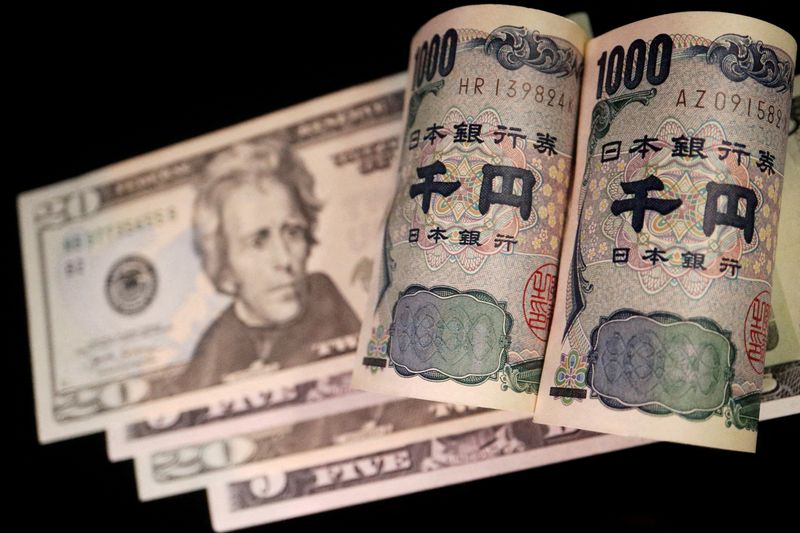
By Vidya Ranganathan
SINGAPORE (Reuters) -Japan's yen took the spotlight in Asia on Monday, weakening to the 150-per-dollar level, but just briefly, as investors betting on a further rise in dollar yields lost out to those expecting Japanese authorities will intervene in markets.
The risk of Israel's war on the Islamist group Hamas becoming a wider regional conflict kept markets on edge, as Israeli air strikes battered Gaza early on Monday, and the United States dispatched more military assets to the region.
U.S. Treasuries were subdued as investors hunkered down for a European Central Bank meeting and U.S. GDP data later in the week.
Ten-year yields were around 4.97%, having briefly popped above 5% last week after Federal Reserve Chair Jerome Powell said the U.S. economy's strength and tight labor markets might warrant tighter financial conditions.
The dollar index added 0.02% to 106.19, with the euro down 0.07% at $1.0586.
The Japanese yen last traded at 149.83 per dollar, after briefly easing early on Monday to 150.14, a level last seen on Oct.3 when traders had suspected the Bank of Japan intervened to nudge it to the stronger side of 150.
Masafumi Yamamoto, chief currency strategist at Mizuho Securities in Tokyo, said it seems like a set of investors were betting the Bank of Japan will defend the 150 level, even as others saw rising U.S. yields as a reason to keep pushing the dollar up.
"Potentially there are two camps out fighting around 150, so that's why dollar-yen doesn't move from here," Yamamoto said.
While there was some speculation the BOJ might once again tweak its yield-curve policy band at a scheduled policy review next week, the BOJ had also shown it will not let domestic yields rise sharply, he said.
The benchmark JGB yield was at 0.835%, just below Friday's peak which was the highest since July 2013. Yields dipped on Friday after the BOJ announced more loans to encourage financial institutions to buy JGBs.
Even though it hasn't risen lockstep with yields, the dollar was underpinned by the steady rise in yields at the long end of the U.S. Treasuries curve, driven by widening term premiums on expectations of stronger growth and fiscal slippage.
Since mid-July, the trade-weighted dollar index is up 6.7% but has been nearly steady this month.
"It is a bit of a puzzle that DXY hasn't retested the early October lows, given its strong foundations of high yields backed by strong growth, strong energy production as concerns grow over the Middle East and haven status," said Sean Callow, a currency strategist with Westpac.
"However, DXY downside is likely limited to the mid-105s and we continue to target 109 in Q4/Q1."
Oil prices dipped on Friday after Hamas released two U.S. hostages from Gaza, leading to hopes the crisis could de-escalate without dragging in the rest of the Middle East region and disrupting oil supplies. Brent crude futures were 0.6% lower at $91.55 a barrel, but are still up 10% over 10 days.
The ECB meets on Thursday. Its rate hiking cycle is over, according to all 85 economists polled by Reuters, but it won't be until at least July 2024 before it begins easing as the battle against elevated inflation continues.
The ECB raised its key interest rates by 25 basis points in September, taking the deposit rate to 4.00% and the refinancing rate to 4.50%, but signalled its 10th hike in a 14-month-long streak was likely to be its last.

